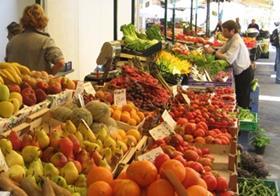
Italy's largest farming organisation Coldiretti has attracted criticism from the country's export trade after it published a blacklist of imported products which it says are contributing to global pollution by being transported over long distances, using up energy and creating greenhouse gas emissions.
The group has called on Italian consumers to adopt 'responsible lifestyles' and 'save the planet' by avoiding a number of imported products traditionally favoured around the Christmas and New Year period.
Included on Coldiretti's list of top 10 'offenders' are Chilean cherries and peaches, Argentine blueberries and Brazilian watermelons, all of which traditionally enjoy strong sales in Italy around this time of year.
Also among the group's list of fresh produce to be avoided are Peruvian asparagus, Mexican blackberries, Californian nuts, Guadeloupe melons, Israeli pomegranates and Egyptian beans, although some of these were cited on grounds relating to food safety as opposed to environmental concerns.
'These foods are polluting our Christmas, wasting energy and contributing to greenhouse gas emissions because of the long journeys they undergo to get to Italy,' the organisation said in a statement.
'During the Christmas holidays, consumption of counter-seasonal products brought in from thousands of kilometres away is a rapidly growing, snobbish trend that is pushing food budgets higher with prices that are ten times those for home-grown Italian apples, pears, kiwifruit, grapes, oranges and clementines,' the group continued.
'This seems completely unjustified because it often involves products that have little taste or flavour, having been harvested before they are fully ripe in order to survive journeys of thousands of kilometres using polluting means which release greenhouse gases into the air.'
According to research published by Coldiretti, one kilo of Chilean cherries has to travel almost 12,000km, consuming 6.9kg of fuel and emitting 21.6kg of carbon dioxide.
The report also suggested that Argentine blueberries and Brazilian watermelons were also guilty of expending too much energy and emitting too much carbon dioxide during their long journeys to Europe.
But many in the trade will see Coldiretti's position as overtly protectionist, designed to protect the consumption of domestic products including apples, citrus and kiwifruit, which are in season now.
The irony of Coldiretti's position was not lost on one commentator writing for Italiafruit News: 'If every country in the rest of the world launched campaigns to block Italian imports – something which is happening in many potential markets – then what would that do for fresh produce made in Italy?' the publication commented.
'Let's not forget that, given the saturation of European markets, the only alternative for our exports is to head for emerging markets that are far away. If these markets shut and continue to keep their borders closed, what future will there be for us?'



